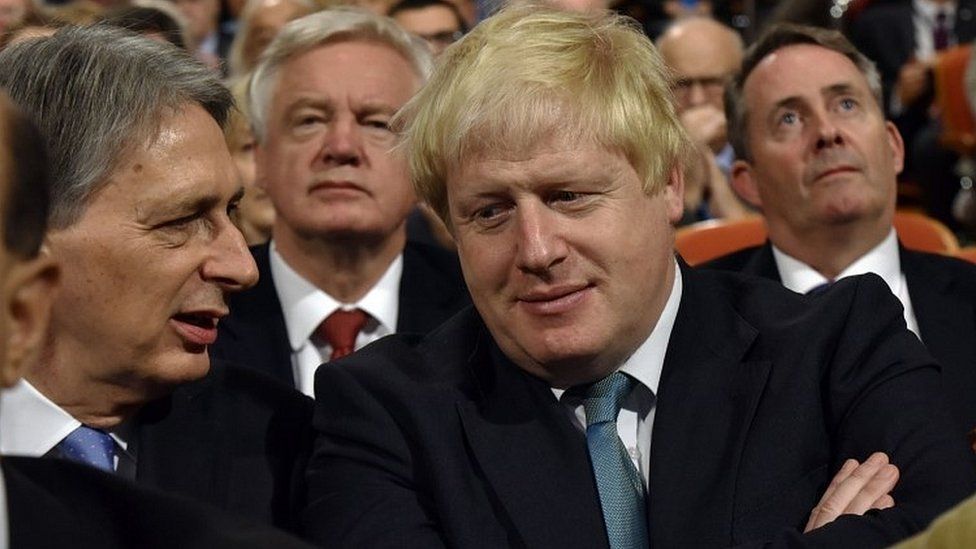Boris Johnson attacks Vince Cable for 'peddling lies'
- Published

Boris Johnson has said suggestions he could resign from the cabinet over Brexit tensions are "lies".
The foreign secretary's spokesman said Lib Dem leader Sir Vince Cable should stop "making stuff up" after he claimed Mr Johnson might quit his role.
Sir Vince's comment came amid reports of cabinet differences over what will happen to immigration after Brexit.
Health Secretary Jeremy Hunt told the BBC he "didn't recognise the picture" of Cabinet splits being reported.
The latest prompt for reports of splits came after International Trade Secretary Liam Fox insisted the cabinet had not agreed a deal on a three-year transitional period after the UK's departure in March 2019 in which free movement would continue in all but name.
He told the Sunday Times the unregulated free movement of labour after Brexit would "not keep faith" with last year's EU referendum result.
On Friday, Chancellor Philip Hammond acknowledged that rules requiring the free movement of people within the EU - which the UK is signed up to as an EU member - would no longer apply after Brexit and all EU nationals coming to the UK after its exit would be expected to register.
However, he said it would take "some time" before a system of full migration controls was established and British firms must be able to "get on with their lives" without "massive disruption" - prompting speculation that the status quo would pretty much continue until 2022.
Archbishop Justin Welby tells Today the timeframe for Brexit too short without cooperation
Sir Vince, whose party opposed Brexit and wants another referendum on the final Brexit settlement, has challenged Mr Johnson to say publicly whether he would back a settlement in which free movement continued until the date of the next election, scheduled for May 2022.
He suggested there was a state of "civil war" between "fundamentalists and pragmatists" in the cabinet and questioned which side of the table Mr Johnson - who was a prominent Leave supporter in the referendum but is regarded as being liberal on immigration - was sitting.
"There is no Cabinet consensus for moderation," he said on Sunday. "And the rumours of Boris Johnson being about to resign fuel the uncertainty."
'Civil war'
Responding to the claims, a spokesman for Mr Johnson said: "Vince Cable is making his stuff up and maybe he should take more time to think up some policies rather than wasting his time on peddling lies."
Asked about the comments on Monday on BBC Radio 4's Today programme, Mr Hunt said there was unity in the Cabinet on delivering a Brexit that restored control over Britain's laws, borders and money, which could involve an implementation period of no more than three years.
"We want Brexit to make Britain more global, and not more insular," he said. "That means that it has to be a Brexit that works for business, it has to work for the NHS, the NHS needs to recruit doctors and nurses from all over Europe and that is going to continue after we leave the European Union."
And Defence Secretary Sir Michael Fallon said the issue of immigration policy during a transitional period would be "one of the details" of the Brexit negotiations.
"We have always understood that we have to ensure immigration is managed properly, that's what the public expect to see - that there are controls of it," he said. "That's one of the details that's going to be sorted out during the negotiations. It's not an argument raging around the Cabinet table."
Meanwhile, the Archbishop of Canterbury has called for outside experts to be drafted in to de-politicise some of the arguments surrounding Brexit.
Speaking on BBC Radio 4's Today, Justin Welby said that while key issues, such as trade and immigration, were fundamentally political, there were thousands of other areas needing agreement in the next 18 months and some of these should be taken "off the political table".
"Can the politicians not put at the front of their minds the needs of the United Kingdom to come out with a functional, working system for Brexit, and agree that certain things will be decided separately in an expert commission, or commission of senior politicians led by someone that is trusted in the political world?" he said.
- Published30 July 2017
- Published28 July 2017